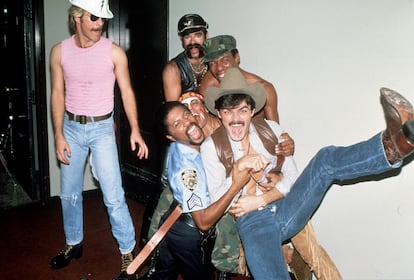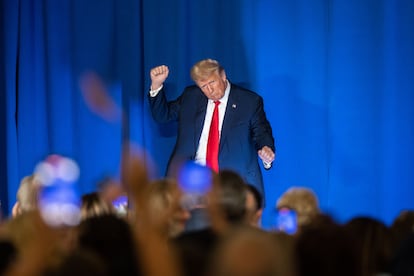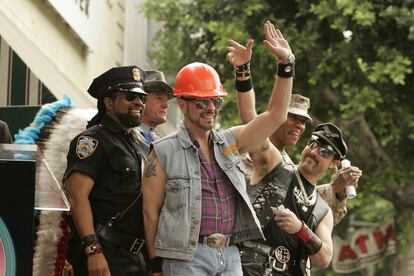“My wife will sue anyone who falsely refers to ‘Y.M.C.A.’ as a gay anthem”: How a Village People classic ended up in the hands of the far right
The group’s biggest hit from 1978 has come back to the forefront due to its unexpected use at Donald Trump’s political rallies and the reaction of its controversial co-writer to those who claim it as an anthem for the LGBTQ+ community

Forty-six years after its release, Y.M.C.A. by the Village People is back in the news and in the charts. Firstly, because of statements by the group’s vocalist and co-writer of the song, Victor Willis, to the effect his wife will sue anyone who says that the song is a gay anthem. And, even more surprisingly (or perhaps not), because Donald Trump approved its use in his presidential campaign.
In fact, none of this is new. Not only has Willis — the African-American singer who dresses up as a policeman and is heterosexual — been saying for years that he did not write Y.M.C.A. with a gay audience in mind, but even the two openly gay members of the group have said so: Randy Jones and Felipe Rose. “What is clear is that there was ambiguity and the writers used double entendres, but Victor is heterosexual, so he was not writing from our point of view. The group was sexually diverse, as well as ethnically diverse,” Rose told The Huffington Post in 2014.
As early as 2007, Willis claimed he wrote the lyrics in Vancouver, Canada, and wanted to reflect the fun activities Black youth in New York could do at the YMCA, such as basketball and swimming. Last week, he was even more outraged. “Since I wrote the lyrics and ought to know what the lyrics I wrote is really about, come January 2025, my wife will start suing each and every news organization that falsely refers to Y.M.C.A., either in their headlines or alluded to in the base of the story, that Y.M.C.A. is somehow a gay anthem,” though he added that he didn’t care if gay people considered Y.M.C.A. as “their anthem.”
What is the underlying theme of this repeated statement? It all points to something that Willis’ publicist, Alice Wolf, revealed in a 2007 interview with The Canadian Press: Willis felt insulted by the assessment that songs such as Macho Man, In The Navy, Go West or Y.M.C.A. were aimed at a gay audience, since he considered it “a niche market” that could undermine his group’s success. According to Wolf, in 1979 the U.S. Navy was on the verge of offering him a large advertising contract to use In The Navy in a promotional campaign, but in the end it came to nothing. Willis then blamed the Village People’s gay image for ruining his chance.

From that same point of view, it would be understandable that Willis would be happy to see Trump use it. When it happened for the first time, in 2020, the composer threatened to sue the Republican magnate, upset with his reaction to movements such as Black Lives Matter. The enormous economic benefit that its use in the latest Trump campaign has brought him led him to change his mind. Willis is also a rather controversial character, who has left the group several times, has been in litigation for years with former colleagues over the ownership of the name Village People — which currently belongs to him alone — and opposed, for example, Y.M.C.A. being played at the opening of the Sochi Winter Olympic Games in 2014, in protest against the Russian government’s policy against the gay community when, curiously, his bandmates did want to perform as a way of positioning themselves in favor of sexual freedom. He has also been arrested several times for crimes related to drug use and for an attempted assault on his partner. He even appeared on the television show America’s Most Wanted.
So… ‘YMCA’ isn’t a gay anthem?
There is some disagreement among Village People members on this question. According to David Hodo (the construction worker), as quoted in Spin magazine’s 2008 oral history of the song: “Y.M.C.A. certainly has a gay origin [...] our first album [1977′s Village People] was possibly the gayest album ever. I mean, look at us. We were a gay group. So was the song written to celebrate gay men at the YMCA? Yes. Absolutely. And gay people love it.”
“In reality, it’s the gay community that grants a song anthem status and ensures that its impact does not wane, transcending generations,” says Núria Martorell, author of the book I Want to Be Free! Queer Artists and Songs for Freedom and Respect (2024). “Y.M.C.A. was, is, and will always be a super-mega queer anthem, and Willis’ insistence on disassociating it from the gay universe seems out of place to me. The LGBTQ+ community is the one that decides what the song represents to them, so the author has little to do with it, no matter how poly they are,” she says with a laugh.

The journalist adds that “Village People is the flagship boy band of the gay movement, and if it is directly associated with the collective, it is precisely because of this song.” She also notes that the name of the group “refers to the New York district of Greenwich Village, a key area for the Gay Liberation Movement and where it all began. On one of its streets, its visionary creator, the French producer Jaques Morali, discovered Felipe Rose, a dancer who performed dressed as an Indian in one of his gay clubs. The rest of the members were recruited later: the singer Victor Willis after seeing him perform in the Broadway musical The Wiz; and David Hodo and Glenn Hughes (the biker), when they attended and passed the casting that he organized after placing the following ad in a newspaper: ‘Macho types with mustaches wanted.’”
“At first, the Village People had a hard time getting out of the disco ghetto,” says music journalist Patricia Godes. “When the first album came out, it was very clear that it was a studio group, and on the cover there were extras, people from Greenwich Village.” The definitive sextet was the one that became known on the cover of Macho Man (1978), “until they became massive with Y.M.C.A., which is their most interesting moment, whatever Victor Willis says, so blatantly gay and so structured in a provocation towards stereotypical masculinities. We looked for a way to turn it into a group, with all these professionals from the theater and nightlife and music, with six singer-dancers and created a character for each one.”
In his oral history of the song on Spin, David Hodo recalled its genesis: “It was 1977, and we were leaving a photography session on 23rd Street. Jacques Morali saw the big pink YMCA on 23rd and asked, ‘What is this YMCA, anyway?’ And after laughing at his accent, we told him the Y was a place where you could go when you first came to New York when you didn’t have any money — you can stay there for very little. And of course, someone joked, ‘Yeah, but don’t bend over in the showers.’ And Jacques, bless his heart, said, ‘I will write a song about this!’”
In the same article, Randy Jones tells it a little differently: “Jacques came up with the idea. But what happened is that when I moved to New York in 1975, I joined the McBurney YMCA on 23rd Street. I took Jacques there three or four times in 1977, and he loved it. He was fascinated by a place where a person could work out with weights, play basketball, swim, take classes, and get a room. Plus, with Jacques being gay, I had a lot of friends I worked out with who were in the adult film industry, and he was impressed by meeting people he had seen in the videos and magazines. Those visits with me planted a seed in him, and that’s how he got the idea for Y.M.C.A. — by literally going to the YMCA.”

From gay clubs to flash mobs
The song was so popular that between 1978 and 1979 it reached number one in 15 countries and sold 12 million singles. The YMCA itself tried to sue the group for trademark infringement, but its leaders eventually reached an agreement with the composers and ended up expressing pride in considering the song a tribute to the organization.
At the same time, a choreography to accompany the song began to become popular, in which each of the four letters of its title were spelled out with the dancers’ hands. There are conflicting theories about how the dance was invented: some say it was improvised on the television show American Bandstand, but the Japanese singer Hideki Saijo (who was number one in his country with a version of the song in 1979), claimed it as his idea.
The fact is that the song, and the dance in question, became a regular accompaniment to major sporting competitions. The most famous one was when it was used by the New York Yankees themselves in their baseball games. It was also used in a Pepsi commercial in 1997, as a wake-up song for a NASA space shuttle crew in 2000, and in 2008 it held the Guinness World Record for the largest number of people dancing to a song (44,000 spectators in unison during its performance at halftime of the NCAA Sun Bowl football game). On New Year’s Eve 2019, the group performed it in Times Square, New York, again breaking their own record.
From there, to Donald Trump’s use of it (along with Macho Man) to end his rallies for the 2020 presidential election, and to accompany his last ride on Air Force One before Joe Biden’s term (whose supporters, incidentally, also celebrated the Democrat’s victory by dancing to the same song). In his campaign this year, Trump not only brought it back again, but he even invented his own dance (dubbed “The Trump Dance”).
Equally surprising is the song’s enormous success in the Jewish community. According to Roger Bennett, co-author of the book Bar Mitzvah Disco: “Y.M.C.A. is the single most important song to hit the Jewish religion since Hava Nagila. And paradoxically, not one of the Village People is Jewish. But they did play a critical function, providing a slew of new role models for Jewish youth. We were under such pressure to become bankers, accountants, and lawyers. They opened our eyes to other career possibilities: a cop, a builder, a flamboyant Indian...” the writer stated in Spin.
And in those same pages, Village Voice columnist Michael Musto argues that Y.M.C.A. “is one of many cultural phenomena that started as a gay in-joke and eventually became stripped of its winkiness and subsumed by the mainstream [...] The Studio 54 set knew full well the Village People were a campy assortment of gay stereotypes nodding to the gays with coded sexual allusions and macho posturing. All these years later, the gay subtext is gone, and it’s a rah-rah crowd-pleaser for the baseball stadium crowd. It happens. A rallying song for the oppressed turns into a middle-of-the-road spirit-lifter, mainly because the straights like to steal things from the gays, take away all the scary edge, and make it their own,” the journalist said years before Trump appropriated the song and, as Patricia Godes argues, “also distorted it, just like when he raised his fist alongside Elon Musk, brandishing a symbol of the workers’ struggle to celebrate the exact opposite.”
Sign up for our weekly newsletter to get more English-language news coverage from EL PAÍS USA Edition
Tu suscripción se está usando en otro dispositivo
¿Quieres añadir otro usuario a tu suscripción?
Si continúas leyendo en este dispositivo, no se podrá leer en el otro.
FlechaTu suscripción se está usando en otro dispositivo y solo puedes acceder a EL PAÍS desde un dispositivo a la vez.
Si quieres compartir tu cuenta, cambia tu suscripción a la modalidad Premium, así podrás añadir otro usuario. Cada uno accederá con su propia cuenta de email, lo que os permitirá personalizar vuestra experiencia en EL PAÍS.
¿Tienes una suscripción de empresa? Accede aquí para contratar más cuentas.
En el caso de no saber quién está usando tu cuenta, te recomendamos cambiar tu contraseña aquí.
Si decides continuar compartiendo tu cuenta, este mensaje se mostrará en tu dispositivo y en el de la otra persona que está usando tu cuenta de forma indefinida, afectando a tu experiencia de lectura. Puedes consultar aquí los términos y condiciones de la suscripción digital.








































